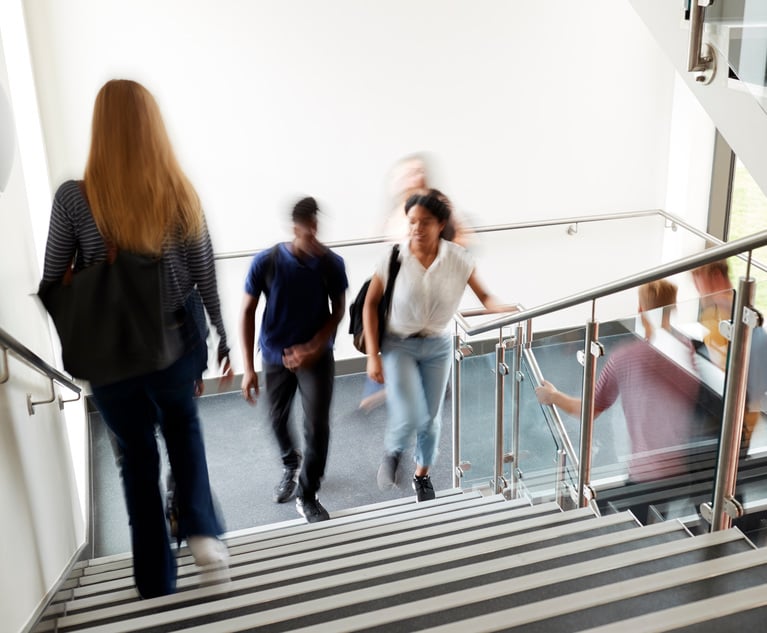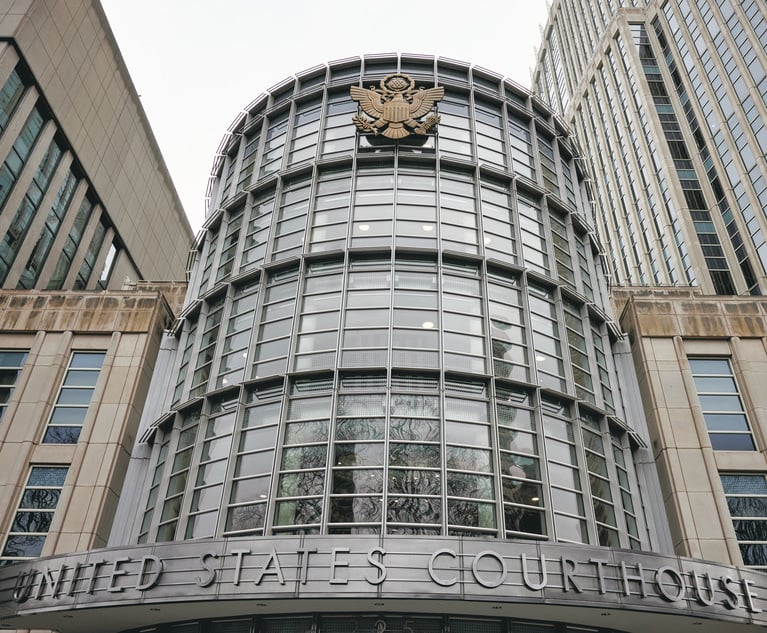 Law school graduates line up to take the New York bar exam at the Jacob K. Javits Convention Center in July 2013. Photo: Monika Kozak/ALM
Law school graduates line up to take the New York bar exam at the Jacob K. Javits Convention Center in July 2013. Photo: Monika Kozak/ALM Law Deans at Top Schools Outside NY Balk at Bar Exam Access Plan
Deans from 20 law schools outside of New York have written to the state's bar authorities, advocating for increased capacity for the September test to ensure their graduates don't get shut out.
May 03, 2020 at 05:00 PM
7 minute read
The original version of this story was published on Law.com
The decision by New York bar authorities to prioritize graduates of the state's 15 law schools for the rescheduled September bar exam has sparked opposition from law deans at schools outside the Empire State.
Deans from 20 non-New York law schools with large percentages of graduates who sit for the bar there have fired off a letter to Chief Judge Janet DiFiore of the New York Court of Appeals, imploring the court to look for ways to ensure everyone who wants to take the September exam may do so.
The May 1 letter came one day after the New York State Board of Law Examiners posted a message on its website stating that seating capacity for the Sept. 9 and 10 exam will be "sharply limited" and that it likely won't be able to accommodate everyone. The board said it will accept applications only from J.D.s and LL.M.s from New York schools from May 5 through May 15.
If seats remain after that period, the board will open up the application process to graduates of schools outside the state. But it's possible that non-New York law graduates could get shut out completely.
"Given the constraints caused by the public health crisis, candidates are strongly encouraged to consider sitting for the [Uniform Bar Exam] at a later date or in other jurisdictions that may be better positioned to accommodate test-takers," reads the board's update. "While our efforts to maximize seating are ongoing, the health and safety of all participants must remain our top priority."
The discord exemplifies the problems the coronavirus pandemic has created in legal education, with law school administrators, students and states grappling with disruption in coursework, licensing and job placement.
The 20 schools whose deans signed the letter to DiFiore collectively had more than 2,000 students take the New York bar in 2019, making up about a fifth of all takers. Deans of every school within the so-called T-14 signed the letter, except for the deans of Columbia Law School; New York University School of Law; and Cornell Law School, each of which are in New York and whose graduates will receive priority on exam registration. Law deans from American University; Boston College; Boston University; Emory University, UCLA; George Washington University; Howard University; Northeastern University, Rutgers; and Washington University in St. Louis also signed the letter.
The prioritization of New York law students has compounded anxiety for those graduating from schools outside the state but who had planned to take the bar exam there, the deans wrote in their letter to DiFiore.
"As you can imagine, the news of your approach has fallen hard on the many students who had planned to sit for the bar in New York this summer or fall, a number of whom have already physically returned or relocated to New York during this pandemic," their letter reads. "And we worry that the resulting delay in the exam's administration and admission to practice will fall hardest on the most economically vulnerable of our graduates and on those whose continued presence in the United States will be compromised by the delay."
The deans offered various suggestions to expand access to the September exam, which was rescheduled after the court canceled the traditional July test due to the COVID-19 outbreak. Among their suggestions is holding two exams in September, one on Sept. 9 and 10, and a second on Sept. 30 and Oct. 1. (The National Conference of Bar Examiners, which designs the exam, is offering jurisdictions two September options for rescheduled tests.) The deans also offered their own campuses as potential test sites for the New York exam, and encouraged the court to pursue an online administration of the bar exam.
A Court of Appeals spokesman said May 3 that DiFiore had received the letter and that the court values the out-of-state law schools and their students. DiFiore plans to respond to the letter and work collaboratively with all parties, said spokesman Lucian Chalfan.
"We share the goal of alleviating the many hardships caused by this unprecedented public health crisis and, in particular, of seating as many candidates as possible for the bar examination in a safe and responsible manner," Chalfan said.
Michigan Law Dean Mark West said on Saturday that the stress and economic uncertainties graduating students feel is "acute," and that news that they might not be able to sit for the New York bar in September has only added to their concerns.
"Every part of that post-grad path has been abruptly disrupted and now, for a large number of our students, they are facing the prospect of not even being able to sit for a bar exam," West wrote in an email. "The change in the New York bar exam policy is a surprise that adds yet another element of uncertainty."
New York's July bar exam is the largest in the country, and typically draws about 10,000 takers. It's a popular option for students from the state who went to law school elsewhere but plan to return to practice, as well as hundreds of students recruited to work at law firms in New York City—the nation's largest legal market.
The July New York bar exam is traditionally administered at six large sites spread across the state, but with social distancing restrictions likely to remain in effect, the board of bar examiners said it has had to look for more venues to host examinees. New York's law schools—which have been given priority for registration—have agreed to make their facilities available for the test, the board said.
"We remain hopeful that, with the assistance of these valued partners, it will be possible to administer the September exam in a safe and responsible manner," reads the board's message.
West said that he was surprised by the board's decision to prioritize graduates of New York law schools, in part because many 3Ls at those schools have already returned to their hometowns outside of the state, given that all classes are now online.
"Law school campuses have been closed for weeks now, so many students who are graduating from New York law schools are no longer in New York, and many students from law schools that aren't located in New York are now in New York (presumably many who are New York residents)," West wrote. "Similar to the issue of taking a bar via courtesy seating, this seems to raise a multitude of additional public health travel-related concerns."
And even though New York uses the Uniform Bar Exam—which allows bar takers to transfer their scores for admission to more than 30 other jurisdictions—West said it's not a perfect solution to simply tell out-of-state students to take the bar in other states that use the uniform exam and then transfer their score to New York.
That process takes longer and costs more, he noted, and most states require that applicants intend to practice in that state, West said. Some states that offer "courtesy seats" for examinees who intend to practice elsewhere have already closed their bar exam application period, he added.
For now, the out-of-state deans told the court in their letter that they want to help facilitate solutions that will ensure more graduates have the opportunity to take the bar.
"We stand ready to work as a group to help identify additional proctors and alternative locations, both inside and outside New York State, and to facilitate any of these solutions," they wrote.
NOT FOR REPRINT
© 2025 ALM Global, LLC, All Rights Reserved. Request academic re-use from www.copyright.com. All other uses, submit a request to [email protected]. For more information visit Asset & Logo Licensing.
You Might Like
View All
The Met Hires GC of Elite University as Next Legal Chief

NY Appellate Panel Cites Student's Disciplinary History While Sending Negligence Claim Against School District to Trial

'No Evidence'?: Big Law Firms Defend Academic Publishers in EDNY Antitrust Case
3 minute read
'Substantive Deficiencies': Judge Grants Big Law Motion Dismissing Ivy League Price-Fixing Claims
3 minute readTrending Stories
- 1'A Death Sentence for TikTok'?: Litigators and Experts Weigh Impact of Potential Ban on Creators and Data Privacy
- 2Bribery Case Against Former Lt. Gov. Brian Benjamin Is Dropped
- 3‘Extremely Disturbing’: AI Firms Face Class Action by ‘Taskers’ Exposed to Traumatic Content
- 4State Appeals Court Revives BraunHagey Lawsuit Alleging $4.2M Unlawful Wire to China
- 5Invoking Trump, AG Bonta Reminds Lawyers of Duties to Noncitizens in Plea Dealing
Who Got The Work
J. Brugh Lower of Gibbons has entered an appearance for industrial equipment supplier Devco Corporation in a pending trademark infringement lawsuit. The suit, accusing the defendant of selling knock-off Graco products, was filed Dec. 18 in New Jersey District Court by Rivkin Radler on behalf of Graco Inc. and Graco Minnesota. The case, assigned to U.S. District Judge Zahid N. Quraishi, is 3:24-cv-11294, Graco Inc. et al v. Devco Corporation.
Who Got The Work
Rebecca Maller-Stein and Kent A. Yalowitz of Arnold & Porter Kaye Scholer have entered their appearances for Hanaco Venture Capital and its executives, Lior Prosor and David Frankel, in a pending securities lawsuit. The action, filed on Dec. 24 in New York Southern District Court by Zell, Aron & Co. on behalf of Goldeneye Advisors, accuses the defendants of negligently and fraudulently managing the plaintiff's $1 million investment. The case, assigned to U.S. District Judge Vernon S. Broderick, is 1:24-cv-09918, Goldeneye Advisors, LLC v. Hanaco Venture Capital, Ltd. et al.
Who Got The Work
Attorneys from A&O Shearman has stepped in as defense counsel for Toronto-Dominion Bank and other defendants in a pending securities class action. The suit, filed Dec. 11 in New York Southern District Court by Bleichmar Fonti & Auld, accuses the defendants of concealing the bank's 'pervasive' deficiencies in regards to its compliance with the Bank Secrecy Act and the quality of its anti-money laundering controls. The case, assigned to U.S. District Judge Arun Subramanian, is 1:24-cv-09445, Gonzalez v. The Toronto-Dominion Bank et al.
Who Got The Work
Crown Castle International, a Pennsylvania company providing shared communications infrastructure, has turned to Luke D. Wolf of Gordon Rees Scully Mansukhani to fend off a pending breach-of-contract lawsuit. The court action, filed Nov. 25 in Michigan Eastern District Court by Hooper Hathaway PC on behalf of The Town Residences LLC, accuses Crown Castle of failing to transfer approximately $30,000 in utility payments from T-Mobile in breach of a roof-top lease and assignment agreement. The case, assigned to U.S. District Judge Susan K. Declercq, is 2:24-cv-13131, The Town Residences LLC v. T-Mobile US, Inc. et al.
Who Got The Work
Wilfred P. Coronato and Daniel M. Schwartz of McCarter & English have stepped in as defense counsel to Electrolux Home Products Inc. in a pending product liability lawsuit. The court action, filed Nov. 26 in New York Eastern District Court by Poulos Lopiccolo PC and Nagel Rice LLP on behalf of David Stern, alleges that the defendant's refrigerators’ drawers and shelving repeatedly break and fall apart within months after purchase. The case, assigned to U.S. District Judge Joan M. Azrack, is 2:24-cv-08204, Stern v. Electrolux Home Products, Inc.
Featured Firms
Law Offices of Gary Martin Hays & Associates, P.C.
(470) 294-1674
Law Offices of Mark E. Salomone
(857) 444-6468
Smith & Hassler
(713) 739-1250






